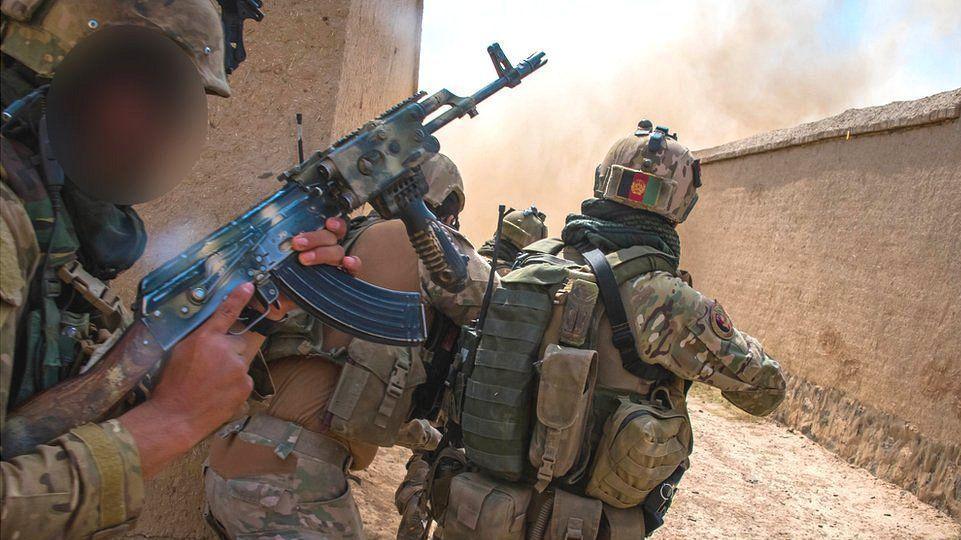Minister: Special forces had veto on Afghan troops

Afghan special forces units known as the 'Triples' worked closely with the SAS in Afghanistan
- Published
The government has admitted misleading Parliament in its response to a BBC report about former Afghan special forces being denied entry to the UK.
BBC Panorama reported in February that UK Special Forces had vetoed resettlement applications from Afghan commandos - known as the “Triples” - who had fought alongside the SAS.
The veto was controversial because it gave UK Special Forces decision-making power at a time when the Afghan commandos were potential witnesses to a war crimes inquiry investigating the SAS.
Former members of the elite regiment said that was a clear conflict of interest, saying it could stop members of the Triples giving evidence by keeping them out of the country.
The BBC report prompted the shadow armed forces minister, Luke Pollard, to write to the Ministry of Defence (MoD) in February to ask whether UK Special Forces did have a veto over Triples applications.
An MoD minister responded: “Addressing the point you raise on a ‘veto’, I can confirm that no such mechanism exists, or has existed, for any government department or government body.”
Separately, the former SNP defence spokesperson, Stewart McDonald, submitted a question in Parliament and was also told UK Special Forces had never had a veto over such applications.
The denials suggested the BBC’s reporting was inaccurate.
But Mr McDonald received a letter this week from Defence Minister Andrew Murrison informing him that an "error has been identified in the parliamentary question response provided to you on 22 March 2024".
The letter went on to say that, under a standard operating procedure previously in use, UK Special Forces assessments had been used by MoD caseworkers to decide whether or not to proceed with Triples’ resettlement applications. That essentially gave them a veto over the applications.
Speaking to the BBC, Mr McDonald said the reversal was “an extraordinary admission by the UK government, and a complete and utter betrayal of those Afghan men who fought alongside UK personnel and now face being hunted and executed by the Taliban”.
Special forces stopped Afghan troops settling in UK
- Published19 February 2024
UK Special Forces at centre of Afghan war crimes inquiry
- Published5 July 2023
Minister describes 'horrific' accounts of SAS war crimes
- Published21 February 2024
Hundreds of resettlement applications by members of the Triples were rejected following the Taliban takeover in 2021, when the veto was in place.
Some of those applications have been seen by the BBC and contained compelling evidence of service alongside the British military in some of the fiercest fighting of the Afghan conflict.
Mr McDonald has now written to the secretary of state for defence, Grant Shapps, to complain that the reversal was “at least the second time that a UK government minister has misled me in my capacity as an elected parliamentarian attempting to exercise democratic oversight over the activity of UK Special Forces”.
Mr McDonald’s letter also says the government’s correction was “sent to a generic public email address at SNP headquarters during the height of an election campaign”, arguing that the reversal had been “sneaked out in the most underhand fashion, clearly in the hope that it would go under radar”.
He said he intended to share the letter with Lord Justice Haddon-Cave, the chair of the Independent Inquiry Relating to Afghanistan, which is currently investigating allegations that the SAS killed unarmed detainees and civilians during the Afghan conflict.
Review delays
The resettlement rejections left many of the former commandos – members of special forces units CF 333 and ATF 444 – in hiding in Afghanistan following the Taliban takeover.
The government had pledged to review 2,000 rejected applications and complete the review process within 12 weeks. But more than four months on, the BBC understands only a tiny fraction of that number has been completed.
In a statement, the MoD said: “There has been no evidence to suggest that any part of the MoD has sought to prevent former members of Afghan specialist units from giving evidence to the inquiry.
“This is a fully independent inquiry which has the full support of the MoD, and we encourage anyone with relevant information to come forward.”
Erin Alcock, a lawyer from the firm Leigh Day, which represents some of the rejected Triples applicants, told the BBC rejected applications had resulted in “large numbers of vulnerable people being wrongly left behind, living in dire conditions, and facing an extreme threat to life”.
Ms Alcock said she welcomed the correcting of the parliamentary record, but called for a “full and frank account of how this flawed process went unchecked for so long”.
A former senior Triples officer, who is now living in the UK, said: “Every day, I have 10, 20, 30 former triples call me looking for answers, and I don’t have any. I don’t understand why the review is taking so long.”
The officer said it was “painful” to hear that UK Special Forces were the ones to have rejected applications.
“We worked alongside them the whole time,” he said. “We fought shoulder to shoulder.”
Do you have information about this story that you want to share?
Get in touch using SecureDrop, a highly anonymous and secure way of whistleblowing to the BBC which uses the TOR network.
Or by using the Signal messaging app, an end-to-end encrypted message service designed to protect your data.
SecureDrop: http://kt2bqe753wj6dgarak2ryj4d6a5tccrivbvod5ab3uxhug5fi624vsqd.onion/
Signal: 0044 7714 956 936
Please note that the SecureDrop link will only work in a Tor browser. For information on keeping secure and anonymous, here's some advice on how to use SecureDrop.